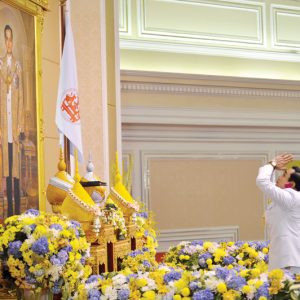Does the continued use of lèse-majesté laws by Thailand’s government to stifle critics reveal its fundamental weakness?
From our January 2016 issue – download the complete issue via our app here
Thailand’s recent use of the controversial lèse-majesté legislation – which restricts anyone from ‘insulting’ the monarchy – has caught the attention of the international press. One instance took place in early December when a Thai man was arrested for ‘liking’ a doctored photograph of the King on Facebook. Then, just weeks later, another man was arrested for mocking the King’s dog on social media. He faces up to 37 years in prison if convicted.

This comes after two individuals – including a celebrity fortune teller of the Crown Prince – died in police custody after being charged with lèse-majesté.
“The use of these laws to stifle dissent is ultimately counterproductive, even from Thai elites’ own blinkered perspective,” said Lee Jones, a senior lecturer at Queen Mary University of London. “It only undermines the monarchy by associating it with ludicrous and ham-fisted attempts to police political life.”
Since its coup in May 2014, the ruling military junta is alleged to have increasingly used lèse-majesté not only to silence critics of the monarchy but also of its undemocratic rule.
“For the junta, this is the ultimate weapon to be used against critics of the military at a time when its legitimacy is put in doubt. When the junta feels insecure, it turns to lèse-majesté to empower itself – but it’s a recipe for disaster,” said Pavin Chachavalpongpun, an associate professor at Kyoto University.
Giles Ji Ungpakorn believes a more fundamental problem lies at the heart of lèse-majesté. He is a former associate professor of political science at Chulalongkorn University who fled Thailand in 2009 after being charged with lèse-majesté.
He says the growth in lèse-majesté charges is a “symptom of extreme unease and lack of confidence in the stability of the monarchy on the part of the elites”.
He added: “The monarchy exists in order to justify the actions of the military and other elites. What the military and the conservative elites fear most is that their ‘mascot’ will crumble to dust.”
Indeed, King Bhumibol Adulyadej is now 88 years old and there is said to be an ongoing struggle to decide who will take his place when he passes.
Keep reading:
“Thailand’s constitution: back to the future?” – Thailand’s recently rejected constitution is back with the government’s scriptwriters, but we should not expect an entirely original sequel


